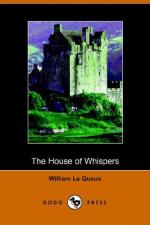“Well, because I have a reason,” she replied in a strained voice—“a strong reason.”
“You’ve grown suddenly shy, afraid of chaff, it seems.”
“My mother is, I fear, not altogether well disposed towards you, Walter,” was her quick response. “Dad is very fond of you, as you well know; but Lady Heyburn has other views for me, I think.”
“And is that the only reason you wish to meet me in secret?” he asked.
She hesitated, became slightly confused, and quickly turned the conversation into a different channel, a fact which caused him increased doubt and reflection.
Yes, something certainly had occurred. That was vividly apparent. A gulf lay between them.
Again he looked straight into her beautiful face, and fell to wondering. What could it all mean? So true had she been to him, so sweet her temperament, so high all her ideals, that he could not bring himself to believe ill of her. He tried to fight down those increasing doubts. He tried to put aside the naked truth which had arisen before him since his return to England. He loved her. Yes, he loved her, and would think no ill of her until he had proof, actual and indisputable.
As far as the eligibility of Walter Murie was concerned there was no question. Even Lady Heyburn could not deny it when she discussed the matter over the tea-cups with her intimate friends.
The family of the Muries of Connachan claimed a respectable antiquity. The original surname of the family was De Balinhard, assumed from an estate of that name in the county of Forfar. Sir Jocelynus de Baldendard, or Balinhard, who witnessed several charters between 1204 and 1225, is the first recorded of the name, but there is no documentary proof of descent before that time; and, indeed, most of the family papers having been burned in 1452, little remains of the early history beyond the names and succession of the possessors of Balinhard from about 1250 till 1350, which are stated in a charter of David II. now preserved in the British Museum. This charter records the grant made by William de Maule to John de Balinhard, filio et heredi quondam Joannis filii Christini filii Joannis de Balinhard, of the lands of Murie, in the county of Perthshire, and from that period, about 1350, the family has borne the name of De Murie instead of De Balinhard. In 1409 Duthac de Murie obtained a charter of the Castle of Connachan, possession of which has been held by the family uninterruptedly ever since, except for about thirty years, when the lands were under forfeiture on account of the Rebellion of 1715.
Near Crieff Junction station the lands of Glencardine and Connachan march together; therefore both Sir Henry Heyburn and his friend, Sir George Murie, had looked upon an alliance between the two houses as quite within the bounds of probability.




